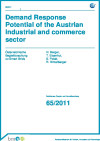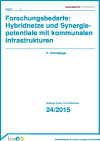Suchergebnisse
SUPOSS - Sustainable Power Supply for Supermarkets and Surroundings
Entwicklung von technischen und kommerziellen Konzepten und Strategien für eine nachhaltige Energieversorgung von Filialen des Lebensmittelhandels und angrenzender Verbraucher (Industrie & Gewerbe, Haushalte) mit Wärme, Strom und Kälte auf Basis der Energieträger Sonne und feste Biomasse.
PESI - Paradigm shift in urban energy systems through synergies with industry
Analysis of different options for the use of industrial surplus energies of various shapes (waste heat, waste water, waste) and renewable energy sources in the industrial sector (e.g. solar panels on roof surfaces) in adjacent urban areas, which act as an "energy sponge". Based on real consumption and availability data, a simulation model was created and opportunities for synergies were documented.
PEAR – Test facility for energy efficient automation and control of buildings
The energy demand calculated in the design phase often differs from measured values in the actual building operation. This projects reviews building automation and operation by presenting a solution how to assess energy efficiency of control strategies in the fields of air conditioning systems, concrete core activation and free cooling. The results are implemented in the demonstration building "Post am Rochus".
Strategic Research Agenda Intelligentes Energiesystem
Die Strategic Research Agenda Intelligente Energienetze (SRA) wird den Forschungsbedarf im Hinblick auf die Optimierung der gesamten Energieinfrastruktur mit dem Zeithorizont 2035 ermitteln und wird im Laufe der Jahre 2014/2015 entwickelt.
Workshop zum Abschluss des Smart Grid Plus ERA-Net-Projekts MATCH
4. Oktober 2018
Institut für Technikfolgen-Abschätzung der ÖAW, Apostelgasse 23, 1030 Wien, AT
Das Institut für Technikfolgen-Abschätzung (ITA) lädt zum Abschluss-Workshop des Projekts MATCH. Es werden Forschungsergebnisse aus Dänemark, Norwegen und Österreich zu erfolgreichen Smart Energy Systems Lösungen für EndnutzerInnen vorgestellt und vorliegende Empfehlungen diskutiert.
Demand Response Potential of the Austrian industrial and commerce sector

Österreichische Begleitforschung zu Smart Grids
Schriftenreihe
65 /2011
H. Berger, T. Eisenhut, S. Polak, R. Hinterberger
Herausgeber: BMVIT
Deutsch, 291 Seiten
Downloads zur Publikation
Smart Services for resource optimized energy systems in urban districts
The concept of a smart city explicitly refers to a sustainable city development. To apply smart city concepts in practice, it is essential to develop practice- and profit-oriented business models (smart services), which at the same time generate social and ecological benefits. Smart services were developed for the application in three specific city development areas and their practicability was verified in a comprehensive stakeholder process with decision makers.
Scenario assessment for the economic market potential of relevant energy technologies.
Economic analyses and scenarios for the future relevance of various sustainable energy technologies considering interaction of technologies, learning effects and exogenous scenario parameters. Recommendations for the future orientation of research and technology development.
Technological as well as economical optimized Biomass CHP systems with regard to state-of-the-art technologies.
Analysis and presentation of representative biomass CHP systems with an electric power output of less than 2 MW. Variation of parameters and identification of potential optimized interactions between specific units. Identification of the economically and thermodynamically most optimized interconnection based on state-of-the-art technologies.
InnoGOK – Investigation of the energetic and ecological usability of solar radiation on urban spaces and paths
Examination of the suitability of street space or other paved or not paved surfaces in urban areas for promoting renewable heat from solar radiation. Thus offers a high potential for increasing energy efficiency and conserving resources in urban contexts. Besides, the dissipation of heat from large solar-heated surfaces promises to prevent urban heat islands.
Räumliche Modelle als Entscheidungsgrundlage für die Inwertsetzung regional verfügbarer Energiepotenziale zur CO2-neutralen Deckung des lokalen Wärmebedarfs
Analytische Methoden der Geoinformatik zur Modellierung regional verfügbarer, erneuerbarer Energiepotenziale für die Evaluierung von Maßnahmen zur CO2-neutralen Wärme- und Kältebereitstellung.
Spatial models as a basis of decision making for the utilisation of regionally available energy potentials for a CO2 neutral satisfaction of the local heat demand
Analytical GIS-methods to model regionally available renewable energy potentials for the evaluation of measures to achieve a CO2-neutral heating and cooling supply.
BioShip - Potentiale und Sicherstellung der Versorgung und Distribution des Bio-Energie Sektors in Österreich unter Nutzung der Binnenschifffahrt in Logistikketten
BioShip untersucht die Potentiale in der Sicherstellung von Versorgung- und Distributionslogistikketten der (Produktions-) Anlagen des biogenen Energiesektors in Österreich (Biomasse-, Biotreibstoff- und Biogasanlagen) unter Miteinbeziehung des energieeffizienten Verkehrsträgers Binnenschifffahrt.
Transfer von Ergebnissen aus der Programmlinie "Fabrik der Zukunft" in die Zielgruppen der betriebsinternen Energiebeauftragten und betrieblichen EnergieberaterInnen
Transfer von Ergebnissen aus der Programmlinie "Fabrik der Zukunft" mit Bezug zu Energieeffizienz und erhöhtem Einsatz erneuerbarer Energien in die Zielgruppen der betriebsinternen Energiebeauftragten und betrieblichen EnergieberaterInnen. Im Zentrum der Transferaktivitäten stehen die zweimalige Durchführung eines eintägigen Seminars für oben genannte Zielgruppen und die Erstellung allgemein zugänglicher Ausbildungsunterlagen.
Development of agitation systems in biogas plants in order to optimize mixing-behaviour and to reduce energy demand with the help of Computational Fluid Dynamics (CFD) simulation
The purpose of this project is the investigation of the mixing-behaviour and performance of the agitation systems in biogas plants, and to present them through Computational Fluid Dynamics (CFD) simulation. This EDP-tool can model and predict the actual fluid dynamics in a closed system. Thus it may help to plan optimal reactor geometries, position and combination of agitation systems as well as to minimize the energy requirements.
Forschungsbedarfe: Hybridnetze und Synergiepotentiale mit kommunalen Infrastrukturen

Schriftenreihe
24/2015
R. Hinterberger
Herausgeber: BMVIT
Deutsch, 26 Seiten
Downloads zur Publikation
Rechtliche, wirtschaftliche und technische Voraussetzungen für die Biogas-Netzeinspeisung in Österreich
Rechtliche, wirtschaftliche und technische Voraussetzungen für eine erfolgreiche Einführung und Marktentwicklung der Biogas-Netzeinspeisung in Österreich. Handlungsbedarf im Bereich Gesetzgebung und Förderung. Kalkulationsgrundlage für Demonstrationsprojekte.
Elektrischer Spitzenlastausgleich in Lebensmittelketten - Strategien zur Verbesserung der Energieeffizienz
Verlagerung und Reduktion von Spitzenlastenergie in Lebensmittelketten durch zusätzliche Speichersysteme und durch Verbrauchsoptimierungen mittels Energiemanagement der Kühlgeräte/-räume. Technisch - wirtschaftliche Machbarkeitsstudie mit hoher Multiplikatorwirkung via involvierter Industriepartner.
Erzeugung und Aufbereitung von Biogas am Standort Wals mit anschließender Einspeisung in das Erdgasnetz
Erzeugung und mehrstufige Aufbereitung von ca. 150 m³/h Biogas in Wals-Siezenheim. Einspeisung in das Erdgasnetz der Salzburg AG. Machbarkeitsnachweis der risikofreien Einspeisung in einem 3 jährigen Betrieb.
IEA HPP Annex 28: Prüfmethoden und Berechnung der Jahresarbeitszahlen für Wärmepumpen
Entwicklung einer Handrechenmethode und Prüfprozedere zur Qualitätssicherung von Wärmepumpen für den kombinierten Heizungs- und Brauchwasserbetrieb - Annex 28 im IEA Heat Pump Program
